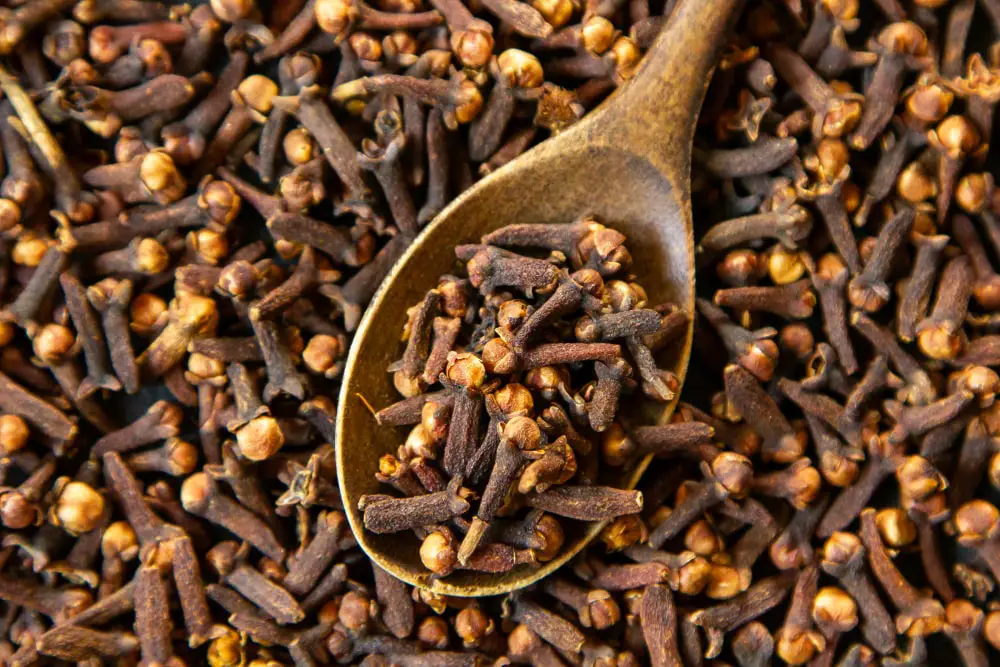This post contains affiliate links. When you buy through our links, we may earn a commission.
Are you wondering what does clove smells like so that you do not spoil the aroma of your dishes? If yes, this article can solve your problem because we are here to answer you. The smell of clove is intense, warm, and pungent.
We understand that you would be curious about the taste and smells of different spices as a food lover. But, also, if you love cooking, you must understand spices’ use and health benefits, including cloves. Therefore, we will discuss all the things that you need to know about cloves. So let’s get started.
Is Clove A Fruit?
Clove is not a fruit, but it is a spice that comes from an immature flower bud. It relates with the family of Myrtaceae and grown in an evergreen tree called Syzygium aromaticum. The flowers of the clove tree are harvested in an immature state and then dried out. Therefore, it is primarily grown for whole clove buds.

In addition, different products of clove are volatile clove oils, whole and ground cloves. It contains Eugenol, acetyl eugenol, volatile oil, methyl salicylate, β-caryophyllene, vanillin, and pinene. Cloves trees grow naturally at Maluku island located in Indonesia. However, it is mainly grown in South America and Asia.
How Does A Clove Look Like?
The whole Cloves look like a tiny, reddish-brown spike. It is about 1 centimeter in length, having a bulbous top. They are like little sticks of the same dark color as cinnamon. While in-ground form, it looks like a smooth powder of the same color, such as coffee or black cardamom powder.
What Does Clove Smell Like?
Cloves have an intense and pungent warm smell. Therefore, it is widely used in food for enhancing flavors and as a preservative.
However, if you have ever smelled a clove, you may have noticed a woody and sweet smell. That’s why the cosmetic industry uses it in fragrances and organic beauty products.
Additionally, due to its warm and spicy smell, it is used in the winter season for coping with winter ailments such as coughs, colds, and sinusitis. Finally, it smells reminds us of holidays and Christmas because most people use clove spice on holidays.
What Does A Clove Do For Your Body?
If you consume clove regularly, then it will bring tremendous changes to your body. It includes vitamin C; therefore, it will increase the white blood cells in your body, leading to a strong immune system.
Moreover, having a cup of tea in the morning, including two cloves, promotes your health and keeps infections at bay.
Furthermore, it elevates the secretion of digestive juices, hence helps in improving the overall digestive system. Along with this, it cures constipation and indigestion because it contains a lot of fiber. Besides, it promotes blood circulation and is suitable for overall health.
Is Clove Poisonous?
Clove can be poisonous, but it depends on its dosage and person health. Clove contains a chemical known as Eugenol. Eugenol slows down the process of blood clotting. Therefore, if you suffer from bleeding disorders, do not take cloves, as they might cause bleeding.
According to a study, Eugenol is toxic if a person takes it in a large amount. In some cases, especially in kids, over-dosage of clove oil can lead to liver damage. Indeed it is also harmful to other body parts.
In addition, it can cause breathing problems such as rapid or shallow breathing and severe cough. Apart from it, painful urination, burning sensation in throat, mouth, stomach, abdominal pain, vomiting and nausea, unconsciousness, and rapid heartbeat are its possible side effects.
Moreover, it is not suitable for anyone who is suffering from plant or food allergies. Besides, it may cause skin problems such as itching and irritation. Therefore, it is better to consult with a doctor before consuming products made with cloves to keep yourself safe.
According to a study in 2012, sometimes clove can disrupt the intestinal microbiota. However, disturbance in it affects gut lining and other infections such as mild diarrhea and fulminant colitis.
Furthermore, keep your children away from its oil. In 1992 a study was conducted on the use of clove oil and its complications in children. In the study, a child suffered from disseminated intravascular coagulation (DIC) and hepatocellular necrosis due to the ingestion of clove oil.
What Are The Health Benefits Of Cloves?
You may know that our ancestors are using cloves for treating health issues for hundreds of years, especially for treating toothache. It is because clove comprises anti-inflammatory and anti-bacterial properties. You may have heard your grandmother recommending clove for dental pain.
Other possible benefits of cloves include strengthening bones, supporting liver heart, stabilizing diabetes. Now, let’s discuss some notable health benefits of cloves.
Comprises Important Nutrients
Cloves contain essential minerals, vitamins, and fibers. About 2 grams of clove has 1 gram fiber, 1 gram carbohydrates, 55% manganese, and 2% vitamin of total daily usage. Manganese helps in brain functions and strengthens bones.
Therefore, adding a small amount of ground or whole clove is a good source of nutrition.
Fight Against Cancer Cells
Cloves include compounds that fight against cancer cells. For example, a study in 2014 by Haizhou Liu and their associates find out that clove reduces the growth of tumors and cancer cells.
In addition, according to the study Eugenol present in clove is responsible for cell death in esophageal cancer cells.
Powerful Anti-Oxidant
Clove includes a power-antioxidant that helps in reducing oxidative stress. Therefore, clove is also beneficial for curing chronic diseases. Eugenol is as well a natural anti-oxidant, which is found in reasonable amounts in cloves.
According to a study, Eugenol is five times more effective than vitamin C in stopping oxidative damages by free radicals.
Good For Liver And Diabetes
Eugenol present in cloves is beneficial for liver health. It reduces the signs of liver cirrhosis when taken in a considerate amount. Additionally, compounds present in cloves called Nigericin maintain blood sugar levels.
Nigericin stimulates the cells to carry more sugar which leads to the high secretion of insulin. Therefore it is suitable for diabetic patients to take at least two cloves a day.
Cure Acne
Another benefit of cloves is that it is suitable for treating acne. Clove contains antiseptic properties, due to which it reduces acne. Also, it prevents blemishes and redness of the skin.
If you have some dark spots on your skin, you can use a few drops of clove oil on it. However, make sure to avoid it if you have sensitive skin.
Anti-Aging Properties
Clove also has anti-aging properties and is considered a mild exfoliator. It removes skin sagging and fine lines. If you want to get a youthful look, mix it with serum or moisturizer and use it as a night cream. Apart from this, it removes dead cells and helps develop new cells that even your skin tone.
Strengthen Bones
A study on the prevalence of low mass density finds out that about 43 billion older people in the U.S are suffering from the low bone mass. In addition, it results in an increased risk of osteoporosis.
As we have already mentioned, cloves contain manganese, so it works in bone formation and increases bone strength. Therefore, the intake of cloves in your diet can help in strengthening bones.
Improves Hairs Growth
Eugenol present in clove increase blood circulation in the scalp and increase hair growth. It is also beneficial for repairing damaged hairs and adding shine to them. You can also mix cloves or oil with coconut oil for hair massage and then wash it with regular shampoo after 2-4 hours. It also prevents premature gray hairs.
Treats Dandruff
Dandruff is a common problem among both males and females. Having dandruff is awful, and it is most embarrassing when it falls over your shoulders. You can use clove oil for this problem because it contains anti-fungal properties. You can add 4-5 drops of clove oil to your regular shampoo as it removes itchiness and fights dandruff.
Anti-Inflammatory Properties
Cloves contain anti-inflammatory and anti-microbial compounds. Due to which it fights against bacteria and is good for treating breakouts.
Besides, it improves oral health and prevents gum infections. You may have noticed that herbal mouth wash contains cloves as a key ingredient.
Prevent Food Poisoning
Research in 2018 shows that Eugenol present in clove oil is a wonderful natural food preservative. Also, it is safe and aromatic. Furthermore, clove can kill common bacteria, including Salmonella, E.coli, Pseudomonas aeruginosa, Staphylococcus, and Streptococcus. These bacterias cause food poisoning, and cloves jump in to treat food-borne diseases.
Reduce Stomach Ulcer
Clove is beneficial to treat stomach ulcers, also called peptic ulcers. You know that the main reason for this disease is stress and infections. Clove oil has compounds that stimulate the production of gastric mucus. Gastric mucus prevents the stomach linings from digestive acids reducing stomach ulcers.
Conclusion
We hope that in the above article we have provided you a satisfactory answer to your question of what does clove smells like? Cloves have many benefits when used inconsiderate amounts in your food and beverages. However, if you have any health complications, first consult your doctor before taking any step.
Additionally, you can use clove to season pot roast, in curries, soups, chutneys, making cakes and cookies to enhance the spicy warmth. It will be proved beneficial if you make it an essential part of your balanced diet. Finally, you can add 4-5 cloves in water and enjoy soothing clove tea.
